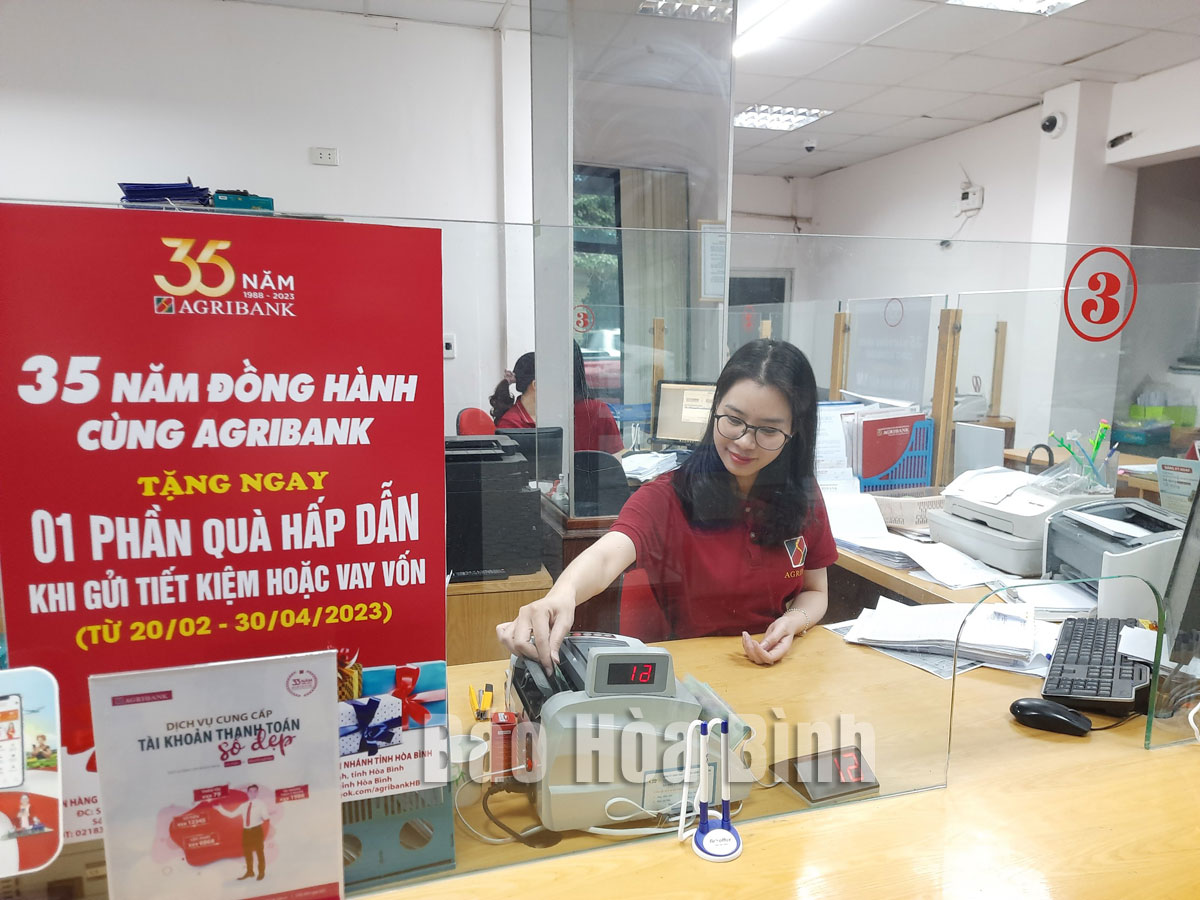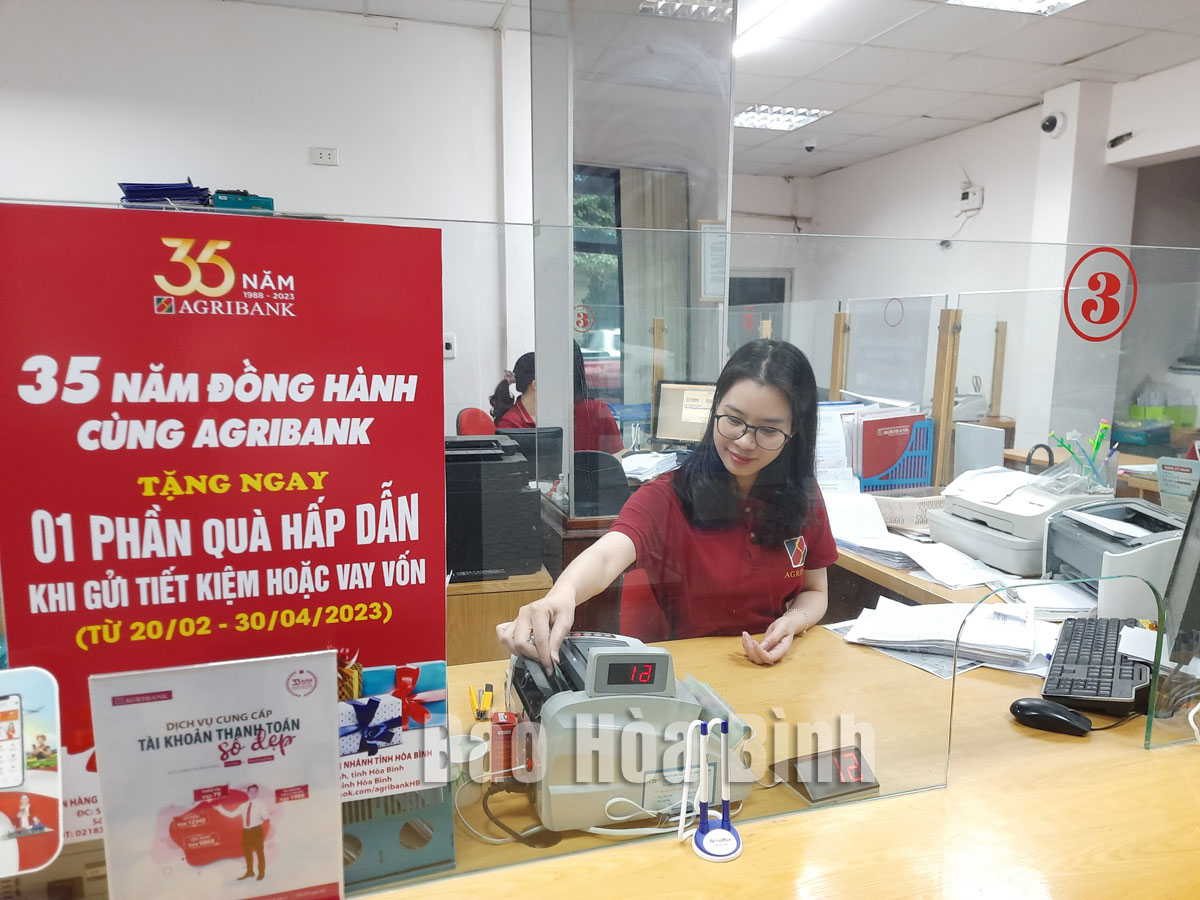
(HBO) – Banks in the northern province of Hoa Binh for years have actively provided credits for economic development, especially to meet the capital needs for production and business of enterprises, cooperatives, and business households.

Agribank Hoa Binh branch.
The banking system in the province now includes the State Bank of Vietnam (SBV)
provincial branch and branches of nine commercial banks - Agribank, BIDV,
Vietinbank, VCB, VPBank, LienVietPostbank, MBbank, BacAbank, HDbank, and Social
Policy Bank of Vietnam, plus a People's Credit Fund.
The province has 4,296 enterprises and 486 cooperatives. Most of the businesses
in the province need loans to boost production and business.
The banking system has been implementing credit programmes and policies under
the direction of the Government and the State Bank of Vietnam to create
favourable conditions for businesses and people to access credit capital,
invest in production and business development, create jobs, restore economic
development, and ensure social security.
As of January 31, 2023, the total locally mobilised capital of
credit institutions reached 40.546 trillion VND (1.73 billion USD). Total
outstanding loans to all economic sectors reached 34.22 trillion VND, of which
loans worth 7.656 trillion VND were offered to 1,203 enterprises, accounting
for 22.4% of the total outstanding loans.
Loans for agriculture and rural areas reached 16.535 trillion
VND, accounting for 48.3% of the total outstanding loans; those for 11
cooperatives reached 34 billion VND; and those for individuals and households
for production and business nearly 24.5 trillion VND.
To support credit activities for businesses, over the recent years, the State
Bank of Vietnam's branch has paid special attention to the programmes that
connect banks and businesses in the province.
Accordingly, the branch regularly signs coordination agreements
with the units to exchange and provide information on monetary and credit
policies.
The central bank’s branch also cooperates with the provincial
business association to promptly capture information and remove difficulties,
and create favourable conditions in accessing bank loans.
According to Ngo Quang Loi, Deputy Director of the State Bank of Vietnam's
provincial branch, up to now, the banking sector has organised 67 dialogue
conferences and working sessions with businesses with a total loan commitment
of 9.23 billion VND.
Outstanding loans under signed programmes are over 6.55 trillion
VND, and loan turnover (accumulated from the beginning of the year) is 7.655
trillion VND.
More than 1,270 customers received loans, including 1,203
businesses.
Banks and credit institutions in the province continue to
implement measures to support borrowers and remove difficulties for customers
under the direction of the Government and the State Bank of Vietnam./.
According to data from the Hoa Binh Provincial Party Committee, the industrial production index for the first six months of 2025 is estimated to have increased by 20% compared to the same period last year. This marks the highest year-on-year growth rate for this period since 2020.
In the first six months of 2025, Hoa Binh province’s export turnover was estimated at 1.145 billion USD, marking an 18.11% increase compared to the same period in 2024. Import turnover was estimated at $ 804 million, a 17.15% increase, which helped the province maintain a positive trade balance.
The lives of the ethnic minority farmers in Tan Lac district have gradually improved thanks to the new directions in agricultural production. This is a testament to the collective strength fostered through the professional associations and groups implemented by various levels of the district’s Farmers’ Union.
With the motto the "product quality comes first,” after nearly one year of establishment and operation, Muong village’s Clean Food Agricultural and Commercial Cooperative, located in Cau Hamlet, Hung Son Commune (Kim Boi district), has launched reputable, high-quality agricultural products to the market that are well-received by consumers. The products such as Muong village’s pork sausage, salt-cured chicken, and salt-cured pork hocks have gradually carved out a place in the market and they are on the path to obtaining the OCOP certification.
In the past, the phrase "bumper harvest, rock-bottom prices" was a familiar refrain for Vietnamese farmers engaged in fragmented, small-scale agriculture. But today, a new spirit is emerging across rural areas of Hoa Binh province - one of collaboration, organisation, and collective economic models that provide a stable foundation for production.
Maintaining growing area codes and packing facility codes in accordance with regulations is a mandatory requirement for agricultural products to be eligible for export. Recently, the Department of Agriculture and Environment of Hoa Binh province has intensified technical supervision of designated farming areas and packing facilities to safeguard the "green passport" that enables its products to access international markets.



